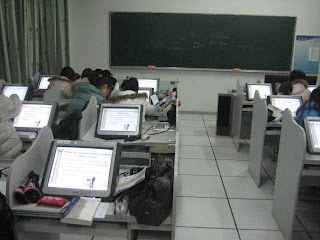One of the more uncomfortable cultural differences for me in the classroom is the absence of small talk at the beginning of class. I always like to start class by just chatting and asking questions like, "How was your weekend?" or "What's up - anything new and exciting going on on campus?" etc. Unfortunately, the students never really know what to say or don't like volunteering anything (or both). I have talked to my tutor about this and explained to her that in my culture it's customary to have a little bit of small talk before getting down to business. My tutor, Daisy, said that they don't really do that in China and that the teacher usually just walks in, greets the students and then immediately starts class. In any case, I am persisting with the small talk even though it usually ends up with both parties feeling wildly uncomfortable. Whatever.
Since I am with groups of smaller students at my part-time job at Web, they have gotten used to chatting together before the lesson starts. Pretty much all of the foreign teachers at Web take the first 10 minutes or so to just talk about what's going on in students' lives or current events. I love hearing what the students are up to because many times they are doing things completely foreign to me. Take yesterday for example.
I was in a class at Web with my favorite (and most adorable student ever) named Momo and when I asked her what she was up to she replied that he hadn't been feeling very well lately. When I asked what she did the previous day, she said that since she got a cold she went immediately to the hospital to get an "IV drip." "You get an IV drip even if you just have a cold?" I asked incredulously and then asked her to explain.
Momo said that getting intravenous therapy in China is becoming more and more common even for small discomforts like a cold. She said that it takes about two hours and costs about 200 RMB (about $30 - pretty pricey by Chinese standards). She said that most people use this type of therapy at least once a year. Sure enough, I spent the whole day asking students whether they had ever had an IV drip before and all of them had. It seems to be more popular with the younger generation, however, since most of my adult students said that they would only go if things got really bad. When I asked Momo what was in the IV drip she didn't know; she said that it was probably medication and that the liquid was very cold to reduce your fever. I had never heard of this before and had no idea that it was so common in China especially for things like a cold.
Today, when I was reading the Beijing Review (an English magazine for foreigners in China), there was an entire article devoted to intravenous therapy titled "To Drip or Not to Drip; Heavy use of intravenous therapy in China causes concern." The article mentioned that China is the world's biggest user of IV therapy averaging 8 bottles of fluid per person while the world average is about 3 bottles per person. "In China, IV infusion has become a common medical therapy, while in foreign countries it is sometimes even considered a minor operation with significant risk."

So why is this happening in China? My students in Web told me that they like to get IV treatments because it is a quick fix; it supposedly cures your cold immediately. Many of the recent college graduates told me that IV therapy is essential to them because they are so busy in their jobs that they can't afford to miss days because of sickness. "Three kinds of people favor IV infusion the most: Those who have taken pills for several days with no visible effect yet; parents who push doctors to use IV therapy on their children because of a favorable curative effect in the past; and those who are busy and have stress-filled lives and want 'quick-fix' therapy and a quick recovery."
But the Chinese adults that I talked to (unless they had children) thought that getting fluids was crazy and that the price was constantly going up as a means for doctors and hospitals to make more money. The article hints at this as well. "The heavy use of IV therapy is absolutely abnormal and even ridiculous. Most patients don't actually need it, but IVs are now even frequently recommended by doctors as a means of curing colds. Some hospitals are questioned by patients for their overuse of IV therapy because of economic profit."
When I saw Momo again later in the week and asked how she was feeling, she said she felt great and concluded it was all because of the fluids she had gotten at the hospital. As other students joined the class we chatted about some of the pros and cons that I had heard recently about the treatment. When I asked the (mostly younger) class if they would still plan on getting an IV infusion the next time they have a cold they all nodded their heads "definitely." One student said, "If it works everyone will keep doing it because it makes you feel better fast; it doesn't matter how much it costs."



























































